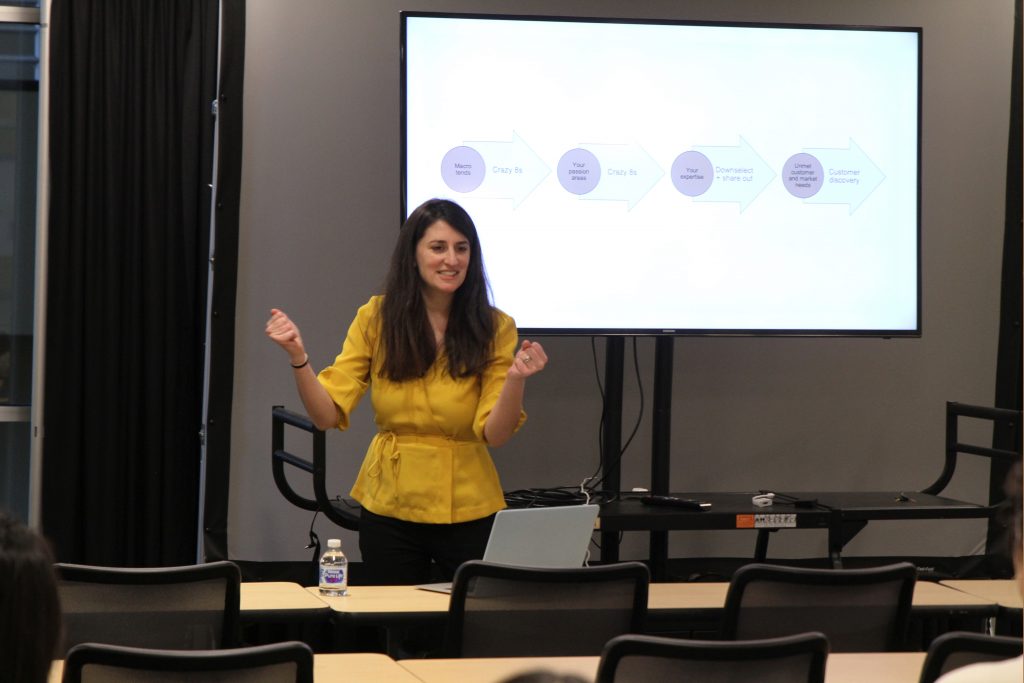
There has been a big push in recent years to advance women in scientific fields, but on Wednesday evening, a workshop aimed to tackle a different issue — turning women’s scientific ideas into successful businesses.
About two dozen female students and faculty attended the “Women Innovators and Entrepreneurs: Women Entrepreneurs Cornell (W.E. Cornell) Ideation Workshop” sponsored by the Binghamton University Office of Entrepreneurship and Innovation Partnerships, the Koffman Southern Tier Incubator and W.E. Cornell. The workshop asked women in science, technology, engineering and mathematics (STEM) fields to identify an idea which matched their passions and could be turned into a startup company. The workshop was led by Andrea Ippolito, program director of W.E. Cornell and a lecturer of engineering management at Cornell University, who has experience in working at biomedical engineering startups.
The attendees participated in two rounds of a brainstorming exercise called “Crazy Eights,” where they tried to come up with eight ideas in eight minutes. The first round pushed them to come up with ideas based off of current macro trends, such as advances in technology like 5G and interests in personalized medicine. The second round had the audience come up with ideas based on their passions. After each round, participants paired up with other audience members to share their thoughts and get feedback. The exercise aimed to push attendees to use their areas of expertise to address the “pain points,” or issues, they see and feel like they can fix.
“You have an initial idea, but you need a push to get started,” Ippolito said. “So what we’re hoping is this process can help them think through how that initial idea aligns to what they’re passionate about — the pain points they may be facing — and also what their expertise is.”
Audience members then pitched their best ideas to a small group. Finding their top ideas signaled the end of the workshop, yet Ippolito hoped to show the audience it was only the beginning of their entrepreneurial journey. The next step, according to Ippolito, is customer discovery where the women start testing their ideas with potential customers.
Attendees will not have to embark on that journey alone. The Koffman Southern Tier Incubator will be running short courses in customer discovery for the National Science Foundation’s Innovation Corps program starting on April 17 and going until May 9. On May 6, it will also have a startup summit to bring together entrepreneurs and business professionals to do workshops and network. Olga Petrova, program director of XCEED, a clean-technology program within the Koffman Southern Tier Incubator, and a technology licensing associate at the BU Office of Entrepreneurship and Innovation Partnerships, said she believes it is important for women to be able to make their STEM ideas an entrepreneurial reality.
“If you are doing work on something in the lab or you have an idea, you should have the same opportunities to try and materialize that idea and bring it to market,” Petrova said.
While the immediate purpose of the workshop was to help those women in attendance with their own ideas and aspirations, Ippolito believes it will have a larger impact on future generations.
“What we’re hoping is that we can encourage and share the pathway more in what is the process to start a company, what are resources in the ecosystem that we can take advantage of, to propel them forward and they can be that new generation of entrepreneurs that are the role models,” Ippolito said. “You can’t be what you can’t see and so what we’re hoping is to expose them to role models throughout this process as well.”


